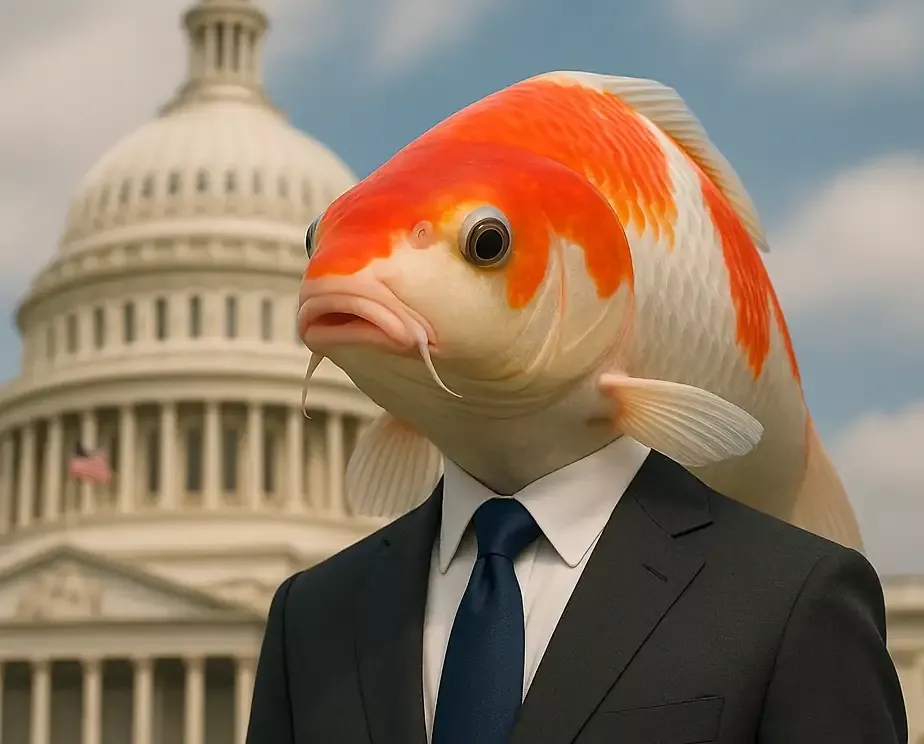The koi hobby might seem a peaceful escape from politics — a tranquil garden where color, calm, and water replace chaos. But when the federal government grinds to a halt, even our ponds can feel the tremors. Here’s how a Washington standoff can ripple all the way to your backyard waterfall.
1. Supply Chain & Imports: The Great Koi Slowdown
Think of the koi trade as a well-balanced ecosystem — fish, food, filters, and freight all swimming in harmony. Now picture someone pulling the plug.
Much of the hobby depends on international supply lines: shimmering imports from Japan, high-end pond gear from abroad, or those fancy probiotics for fish food that come with more stamps than a passport. When government inspectors and customs agents are sent home or understaffed, shipments can bottleneck at ports.
That means koi shipments could sit in limbo, food and chemical imports may take longer to arrive, and shipping costs might balloon like a bloated goldfish.
You might not find a headline saying “Shutdown Stalls Showa Imports”, but the logic tracks — fewer inspectors and slower paperwork equal longer waits, higher costs, and sometimes even temporary shortages. Stock up before your fish start eyeing the duckweed menu.
2. Regulation & Water Watchdogs on Vacation
Every koi keeper knows the importance of clean, healthy water — but what happens when the people monitoring water quality take an unplanned “government-mandated sabbatical”?
Environmental oversight, disease checks, and import inspections all slow down. Sure, fewer regulators might sound like fewer headaches — until a koi virus or invasive hitchhiker slips through the cracks.
Without those extra eyes, disease surveillance weakens. A single untested shipment could introduce something nasty that spreads faster than algae in July. It’s not a horror movie… but it could be for your pond.
3. Economic Ripples: When Wallets Tighten, Filters Don’t Flow
Even if you’re not importing koi directly, your wallet may feel the pinch. A shutdown means furloughed workers, late paychecks, and nervous consumers.
Translation: fewer people splurging on show-grade koi or that sleek new drum filter you’ve been eyeing. On the business side, distributors may raise prices to stay afloat, and hobby shops could see slower sales or thinner stock.
The koi market isn’t immune to mood swings — when the economy coughs, the hobby sneezes. Expect slower growth, pricier goods, and maybe more fish hitting the resale market as people trim their spending.
4. Shows, Travel, and Import Adventures on Hold
For the die-hard koi enthusiast, the shutdown can also throw a wrench into travel and event plans. Koi shows, auctions, and trips to Japanese breeders often rely on smooth customs and travel systems — and that’s tough when parts of the government are running on half battery.
Flights still run, but staffing shortages at airports and customs desks can cause delays. Import certifications and insurance paperwork can pile up like leaves in your skimmer. Even overseas breeders may hesitate to ship during uncertain times.
The result? Fewer new arrivals, postponed shows, and more stress for people who just wanted to talk about gin rin patterns and pond pH.
5. Long-Term Ecosystem Risks: When the Pond Economy Gets Cloudy
If the shutdown drags on, small koi businesses — the folks who make specialized foods, design filtration systems, or breed domestic koi — could face cash-flow crunches. Innovation slows, selection shrinks, and prices can rise.
Desperate sellers might cut corners: skipping health checks, importing uncertified fish, or dealing in “gray market” koi of mysterious origin. Hobbyists should stay alert — a fish without a clear lineage or quarantine record is a gamble.
Keep your purchases transparent, your quarantine tanks ready, and your skepticism healthy.
Practical Tips for Weathering the Shutdown
- Stock up smartly. Don’t panic-buy, but make sure your pantry (and pond shed) can handle a few weeks of import hiccups.
- Check credentials twice. Demand proof of health, origin, and water conditions from any new suppliers.
- Budget for bumps. Expect minor price increases or delays — build that into your koi plans.
- Think local. Domestic breeders and small shops may become your best allies. Support them.
- Guard your pond’s balance. Keep filters clean, water pristine, and systems steady. The calmer your pond, the less outside chaos matters.
- Stay informed. Follow trade updates, hobby forums, or koi associations for early signs of supply issues.
Government shutdowns might seem like political theater far removed from your garden pond — but when agencies stop, the ripples spread far. From import delays to price hikes, the koi world feels those currents in quiet but measurable ways.
So don’t panic — prepare. Stock a little, plan ahead, and focus on what you can control: clear water, healthy koi, and the peaceful hum of your filters. Because even in uncertain times, your koi will still be there — gliding gracefully through it all, a living reminder that calm can outlast chaos.
